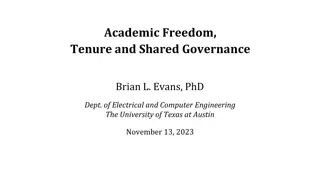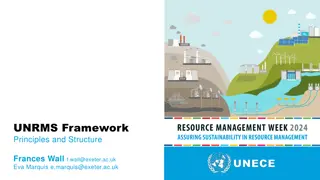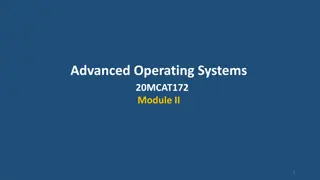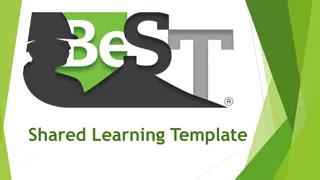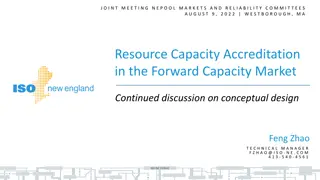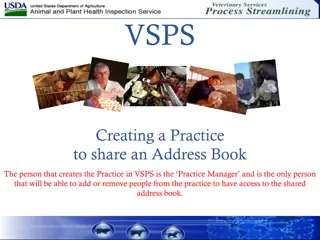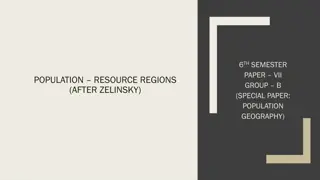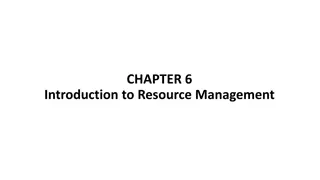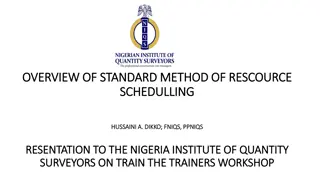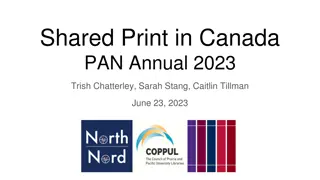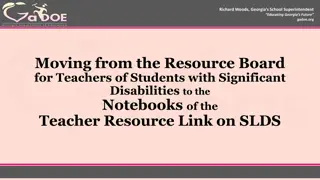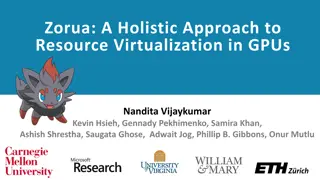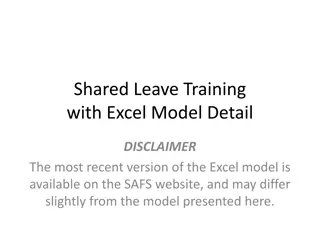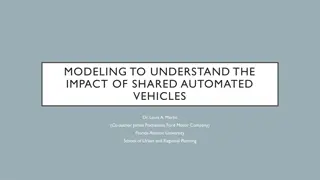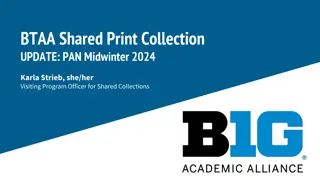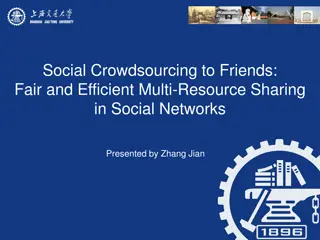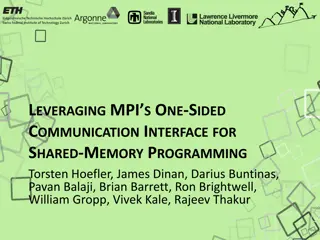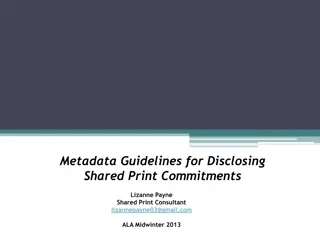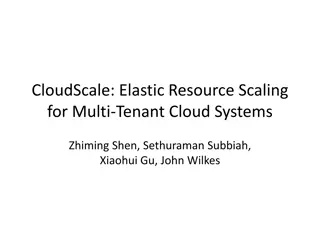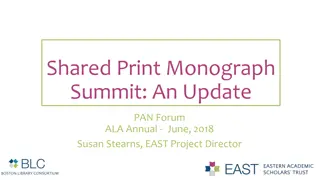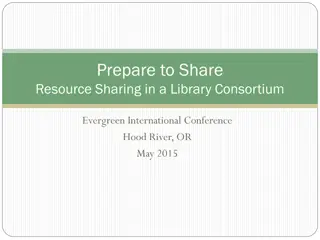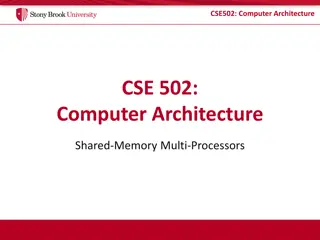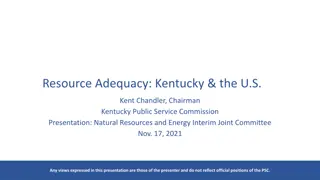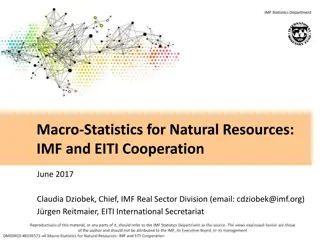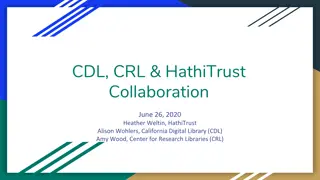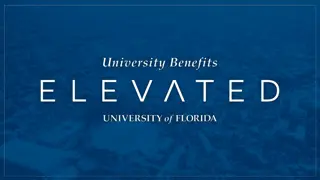Efficient Resource Mobilization and Management Strategies by Dr. Abraham Maliet Mamer
This content discusses efficient resource mobilization and management strategies, emphasizing the importance of understanding the typical cycle of resource regime, defining resources, identifying resources, and mobilizing resources effectively. It provides insights into resource allocation methodolo
2 views • 12 slides
Importance of Academic Freedom, Tenure, and Shared Governance in Higher Education
Academic freedom, tenure, and shared governance are crucial in higher education for fostering open inquiry, protecting faculty rights, and ensuring institutional integrity. Organizations like the American Association of University Professors (AAUP) advocate for these principles to uphold faculty aut
5 views • 9 slides
Comprehensive Overview of UNRMS Framework and Principles
UNRMS (UN Resource Management System) aims to promote sustainable resource management globally through innovative frameworks and principles. It encompasses various natural resources and supports sustainability at different scales. Stakeholders can use it to assess projects against environmental, soc
5 views • 10 slides
Understanding Cladograms and Phylogenetic Analysis
Cladograms are used in cladistics to illustrate evolutionary relationships between organisms based on shared ancestral and derived characters. They are created by grouping species by common descent, forming clades that include an ancestral species and all its descendants. Valid clades are monophylet
0 views • 11 slides
Understanding Distributed Mutual Exclusion in Operating Systems
In distributed systems, the problem of mutual exclusion arises when multiple sites/processes need to access shared resources concurrently. Unlike in single-computer systems, distributed systems lack shared memory, leading to the need for communication-based approaches rather than shared variables li
0 views • 49 slides
Understanding Shared Memory Architectures and Cache Coherence
Shared memory architectures involve multiple CPUs sharing one memory with a global address space, with challenges like the cache coherence problem. This summary delves into UMA and NUMA architectures, addressing issues like memory latency and bandwidth, as well as the bus-based UMA and NUMA shared m
0 views • 27 slides
Enhancing Organizational Learning through BeSafe Taranaki Shared Learnings
BeSafe Taranaki Shared Learnings aims to facilitate cross-organizational learning by sharing insights from incidents and investigations. The focus is on identifying key lessons, target audiences, necessary process changes, and safety expectations. Two types of learnings are emphasized: Immediate Not
2 views • 9 slides
Forward Capacity Market Resource Capacity Accreditation Discussion
Discussion on improvements to resource capacity accreditation in the Forward Capacity Market to support a reliable, clean-energy transition by accrediting resource contributions effectively as the resource mix evolves. Covers conceptual design, stakeholder schedule, and review of proposed enhancemen
0 views • 61 slides
Creating a Shared Address Book in VSPS
Learn how to create a shared address book in VSPS by setting up a practice managed by the Practice Manager, who can add or remove users to access the address book. Follow step-by-step instructions to invite users and manage access to the shared address book efficiently.
0 views • 24 slides
Population Resource Regions and Zelinsky's Classification
Geographers have long studied the relationship between population growth and resource adequacy, leading to the concept of Population Resource Regions (PRR) by W. Zelinsky. Zelinsky identified five types of PRR based on population-resource ratios, ranging from Type A with high resource utilization po
0 views • 8 slides
Introduction to Resource Management in Construction Industry
The construction industry operates in a dynamic environment with time, money, and resource constraints. This chapter focuses on resource management, optimization methods, and applications in construction. It covers the definition of resources, types of resources, and the importance of optimization i
3 views • 15 slides
Understanding Shared Memory Architectures and Cache Coherence
Shared memory architectures involve multiple CPUs accessing a common memory, leading to challenges like the cache coherence problem. This article delves into different types of shared memory architectures, such as UMA and NUMA, and explores the cache coherence issue and protocols. It also highlights
2 views • 27 slides
Overview of Standard Method of Resource Scheduling for Effective Project Management
Resource Schedule Documents (RSD) prepared using Standard Method of Resource Scheduling 1 (SMRS 1) facilitate efficient allocation, planning, and management of resources. The RSD includes sections detailing employer and contractor responsibilities, material issues, method statements, and charges. SM
0 views • 9 slides
Shared Living Service Overview for Independent Living with Supports
The Shared Living Service, facilitated by Deanna L. Parker, MPA VA DBHDS, offers individuals aged 18 and above the opportunity to live independently with some support. This service is available under all three waivers and entails a one-to-one living arrangement where a roommate provides agreed-upon
0 views • 20 slides
Collaborative Shared Print Initiatives in Canadian Libraries: PAN Annual 2023
North/Nord initiative began in August 2021 to coordinate shared print efforts across Canadian libraries, focusing on Canadian materials. The program evaluation is set for Summer 2023, emphasizing collaboration for success. COPPUL SPAN expands on prioritizing partnerships, Indigenous publications, an
3 views • 5 slides
Understanding the Economic Problem: Choices and Resource Allocation
This comprehensive study covers key concepts in economics, such as the economic problem, cost-benefit analysis, resource scarcity, production possibilities, and distribution of resources. It delves into the importance of costs and benefits in decision-making, categorizing them, and identifying varia
0 views • 16 slides
Understanding the Importance of 4-H Natural Resource Clubs for Youth Development
Exploring the significance of 4-H Natural Resource Clubs through insights from surveys conducted among 4-H members, Extension Educators, and Natural Resource Professionals. The data highlights motivations, barriers, and suggested resources to enhance participation in natural resource projects, empha
0 views • 17 slides
Moving Instructional Tasks to Teacher Resource Link - Richard Woods, Georgia's School Superintendent
Richard Woods, Georgia's School Superintendent, is transitioning ELA and Math instructional tasks for students with significant disabilities from the Resource Board to the Teacher Resource Link (TRL) accessible through SLDS. Science and Social Studies items will soon be available on TRL as well. The
1 views • 12 slides
Understanding Citizenship: A Shared Identity and History
Explore the diverse perspectives on citizenship through respectful devotion to one's country or school. Discover what citizenship means to individuals in just six words and how it ties into shared histories and identities. Delve into the American Dream and the shared privilege it represents, emphasi
0 views • 18 slides
Zorua: A Holistic Resource Virtualization in GPUs Approach
This paper presents Zorua, a holistic resource virtualization framework for GPUs that aims to reduce the dependence on programmer-specific resource usage, enhance resource efficiency in optimized code, and improve programming ease and performance portability. It addresses key issues such as static a
0 views • 43 slides
Excel Model for Shared Leave Training Detail
The Excel model for shared leave training detail allows school district employees to share leave both within and outside their district. The model facilitates the calculation of hourly salary rates and benefits for employees interested in participating in the shared leave program. The implementation
0 views • 12 slides
Effective Strategies for Shared Reading in Non-Fiction Settings
Shared reading in non-fiction is an effective approach to reinforce literacy skills while teaching subject-specific content. Teachers choose texts that match students' reading levels, are cross-curricular, and engaging. Discussions, predictions, vocabulary exploration, and historical context are int
0 views • 22 slides
Introduction to Boston University's Shared Computing Cluster
Boston University's Shared Computing Cluster (SCC) provides researchers with access to a high-performance computing environment for running code, collaborating on shared data, and utilizing specialized software packages. With over 800 nodes, 20,000 processors, and hundreds of GPUs, the SCC offers re
0 views • 63 slides
Impact of Shared Automated Vehicles on Transportation System Performance
This study by Dr. Louis A. Merlin and James Fischelson explores the potential impact of shared automated vehicles on transportation systems. By reviewing 39 papers and simulations, the research delves into the implications of new shared automated modes, such as automated taxis, shuttles, and shared
0 views • 38 slides
Transforming Big Ten Libraries through Shared Print Collections and Collective Action
Aspiration for a tremendous vision to unite Big Ten university collections into one shared and fully networked "BIG Collection." This initiative aims to increase findability, usability, and value at scale while deepening interdependence and resilience for an uncertain future. The Knowledge Commons w
1 views • 10 slides
Debate on Shared Sanitation: Improved or Not?
The discussion revolves around the classification of shared sanitation as improved or unimproved. WHO and UNICEF have a classification system where shared sanitation is considered unimproved due to concerns about cleanliness and accessibility. A proposed policy change by JMP seeks to include shared
0 views • 22 slides
Fair and Efficient Multi-Resource Sharing in Social Networks
This paper explores the concept of fair and efficient multi-resource sharing in social networks, presenting a credit market-based framework for charge-free computing resource sharing. It addresses the challenges of escalating data volumes and the need for collaborative resource allocation strategies
0 views • 21 slides
Leveraging MPI's One-Sided Communication Interface for Shared Memory Programming
This content discusses the utilization of MPI's one-sided communication interface for shared memory programming, addressing the benefits of using multi- and manycore systems, challenges in programming shared memory efficiently, the differences between MPI and OS tools, MPI-3.0 one-sided memory model
0 views • 20 slides
Metadata Guidelines for Disclosing Shared Print Commitments
Shared Print Metadata Guidelines aim to establish new Shared Print Institution Symbols and add them to bibliographic records for resource sharing. These guidelines involve creating MARC Local Holdings Records (LHRs) to document archiving commitments for journals. The Shared Print initiative supports
1 views • 12 slides
CloudScale: Elastic Resource Scaling for Multi-Tenant Cloud Systems
CloudScale is an automatic resource scaling system designed to meet Service Level Objective (SLO) requirements with minimal resource and energy cost. The architecture involves resource demand prediction, host prediction, error correction, virtual machine scaling, and conflict handling. Module 1 focu
0 views • 37 slides
Challenges of Flow Rate Fairness in Network Resource Allocation
Addressing the concept of flow rate fairness in network resource allocation, this content explores its limitations and challenges. Despite being a goal in protocols like TCP, the practicality and enforceability of flow rate fairness are questioned. It highlights the inadequacy of flow rate as a meas
1 views • 15 slides
Shared Print Monograph Summit: Progress and Future Directions
The Shared Print Monograph Summit held in June 2018 focused on collaboration and coordination among North American shared print programs. Key priorities included open data on retention commitments, research on risks, establishing community standards, and more. Working groups were formed to address o
0 views • 24 slides
Enhancing Library Consortium Resource Sharing: NC Cardinal Case Study
Explore the success story of the NC Cardinal Consortium in revolutionizing resource sharing among public libraries. From its formation to significant growth in library systems, learn about the key advantages, statistics, transit numbers, and holds strategies that have led to improved patron services
0 views • 22 slides
Understanding Computer Architecture: Shared Memory Systems
Shared memory multiprocessors in computer architecture involve multiple threads using shared memory for communication, with synchronization complexities and implicit communication challenges. Despite these drawbacks, Shared Memory Systems have proven to be successful machines due to their evolutiona
0 views • 40 slides
Resource Adequacy in Kentucky and the U.S.: Regulatory Insights
Presentation by Kent Chandler, Chairman of the Kentucky Public Service Commission, highlighting the significance of resource adequacy in ensuring reliable electricity supply. The role of regulatory agencies like PSC in reviewing utility investments, integrated resource planning, and the distinction
0 views • 14 slides
Exploring Community Forests: A Shared Community Resource
Discover the concept of community forests as a shared community resource, encompassing community ownership, participation, and benefits. Learn about models, benefits, and steps in community forest projects, along with real-world examples and the role of project managers in organizations like the Tru
0 views • 13 slides
IMF Statistics Department - Natural Resources Statistical Tools
IMF Statistics Department has developed two statistical tools, the Revenue Template and National Accounts Template, to help countries analyze government revenues and natural resources in national accounts. These tools are crucial for policymaking in countries heavily reliant on natural resource reve
1 views • 9 slides
Collaboration for Shared Print Collections: Vision, Mission, and Principles
This collaboration between HathiTrust, CDL, and CRL aims to enhance access to shared print collections, promote equity in scholarly resources, and leverage networks for collaborative infrastructure. The vision includes embedding shared print in library collections, enriching the scholarly record, an
0 views • 10 slides
Employee Community Resources at UF: Family Resource Coordinator Services
Providing UF employees access to valuable community resources through the Family Resource Coordinator, including discounted services for childcare, housing, health & wellness, transportation, entertainment, campus discounts, food, and more. Additional on-campus resources such as the Field and Fork P
0 views • 6 slides
Enhancing Capacity Planning for Peak Demand and Flexible Resource Requirements
Addressing the challenges in identifying capacity needs for utilities and regions, the discussion covers PowerSimm's approach compared to other modeling tools, resource capability characterization, and regional resource sharing opportunities. The article also reviews comments on NorthWestern's syste
0 views • 17 slides

